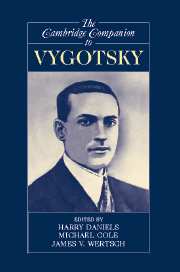Book contents
- Frontmatter
- Editors’ Introduction
- Part I: Vygotsky in Context
- 1 Vygotsky in Context: 1900-1935
- 2 Vygotsky’s Demons
- 3 An Interesting Resemblance: Vygotsky, Mead, and American Pragmatism
- 4 Vygotsky, Mead, and the New Sociocultural Studies of Identity
- 5 Vygotsky on Thinking and Speaking
- Part II: Readings of Vygotsky
- Part III: Applications of Vygotsky’s Work
- References
- Index
1 - Vygotsky in Context: 1900-1935
from Part I: - Vygotsky in Context
Published online by Cambridge University Press: 28 November 2007
- Frontmatter
- Editors’ Introduction
- Part I: Vygotsky in Context
- 1 Vygotsky in Context: 1900-1935
- 2 Vygotsky’s Demons
- 3 An Interesting Resemblance: Vygotsky, Mead, and American Pragmatism
- 4 Vygotsky, Mead, and the New Sociocultural Studies of Identity
- 5 Vygotsky on Thinking and Speaking
- Part II: Readings of Vygotsky
- Part III: Applications of Vygotsky’s Work
- References
- Index
Summary
It is a fundamental tenet of Vygotskian theory that in order to understand the inner mental processes of human beings, we must look at human beings in their sociocultural context. We should not look for the explanation of human behavior in the depths of the brain or the soul but in the external living conditions of persons and, most of all, in the external conditions of their societal life - in their social-historical forms of existence (Luria, 1979, p. 23).
By accepting this tenet and generalizing it to the understanding of the creative work of investigators, we might say that in order to more fully understand the work of a specific thinker, we should step outside of that thinker's mind and take a look at the broader socioeconomic and sociocultural background in which he or she worked. The researcher's private abilities and preferences undoubtedly play a role in the creation of major theories, but the shaping of character, inclinations, and abilities of the researcher takes place in a specific sociocultural context, and every scientist is dependent on the ideas and tools available in his or her time. There is no true understanding of an investigator's theories, then, without an assessment of the broad context in which the theories were created (cf. Van der Veer, 1997).
- Type
- Chapter
- Information
- The Cambridge Companion to Vygotsky , pp. 21 - 49Publisher: Cambridge University PressPrint publication year: 2007
- 17
- Cited by

